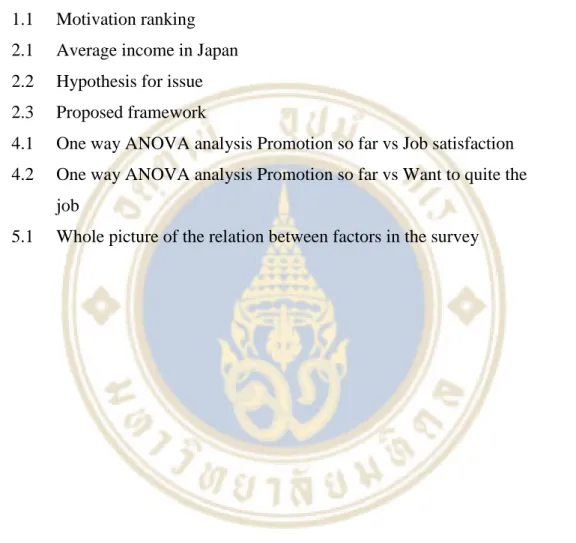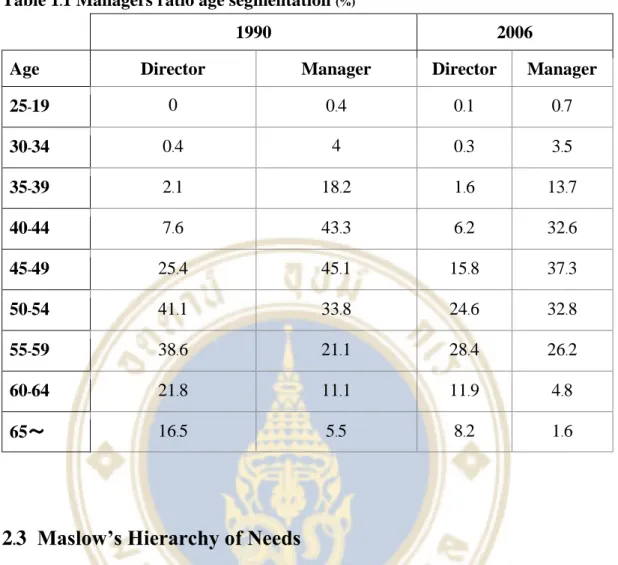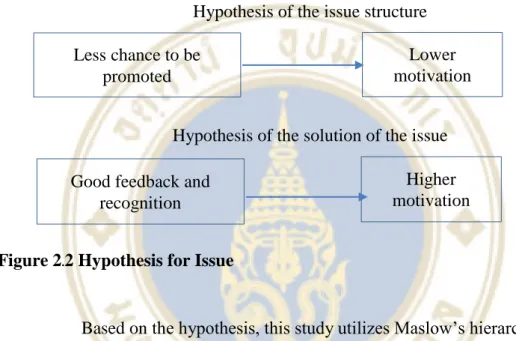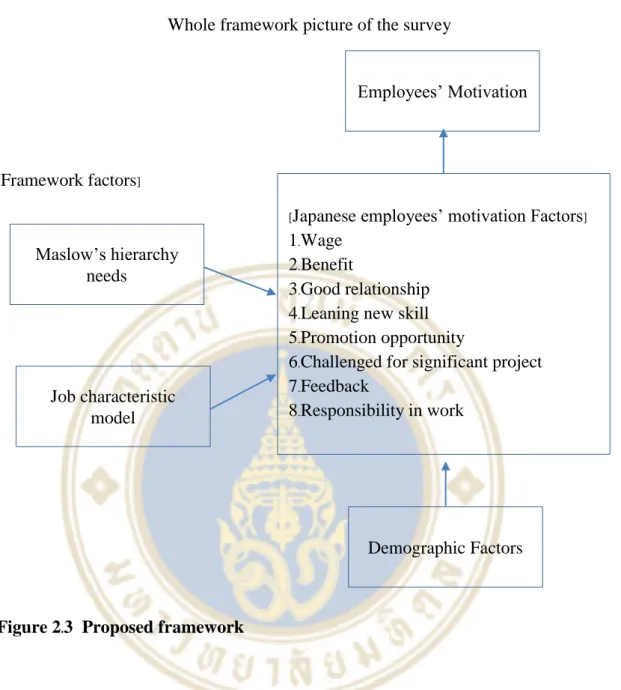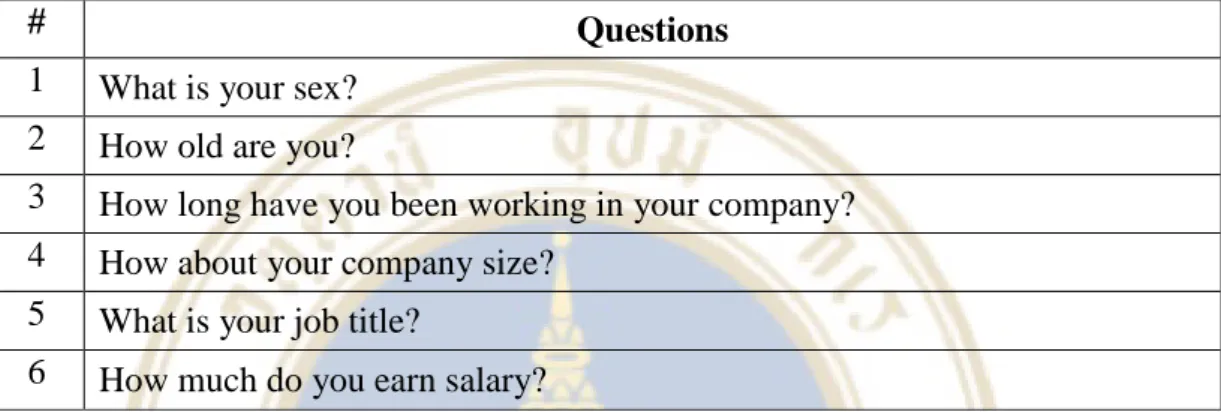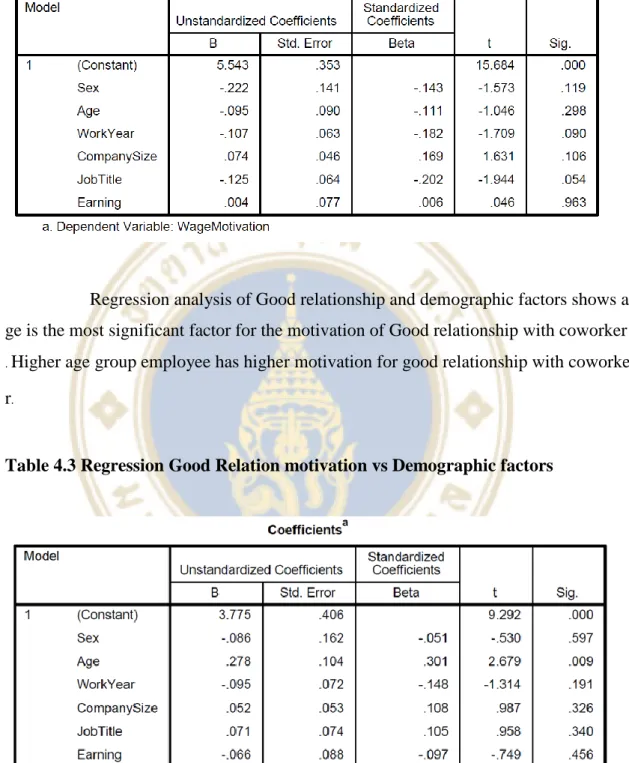The author would like to express his deepest gratitude and sincere appreciation to his advisor, Asst. The author would like to thank all Faculties of the College of Management Mahidol University (CMMU) for their kind help and support during his studies at CMMU. The author also thanks and appreciates all the respondents and friends for their valuable time and sharing of information that enables him to analyze data and get valuable output that is significant for this study.
The author would like to express his deep gratitude to all his 18C CMMU friends, especially his Marketing Management friends for their help, suggestions and comments during the whole period of the study of master's degree. Cross Tab Analysis Promotion to date vs Job satisfaction Cross Tab Analysis Promotion to date vs Do you want to quit the job Regression Pay motivation vs Maslow's hierarchy of needs Regression Pay motivation vs Job characteristics model Regression Benefit motivation vs Maslow's hierarchy of needs Regression Benefit motivation vs Job characteristics model Regression Good Relationship motivation vs Maslow's hierarchy of needs. Regression Good Relationship motivation vs Work characteristics model Regression Good Relationship motivation vs Maslow's hierarchy of needs.
Regression Good Relationship motivation versus job characteristics model Regression Promotion motivation versus Maslow's hierarchy of needs Regression Promotion motivation versus job characteristics model Regression Challenge project motivation versus Maslow's hierarchy of needs.
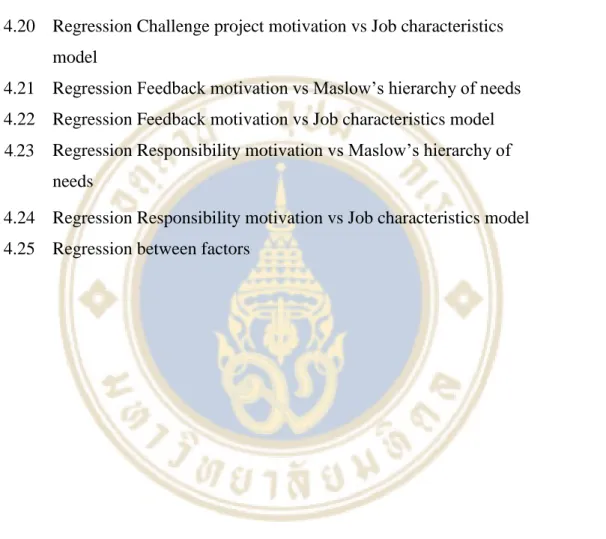
INTRODUCTION
Research Introduction
This study focused on the question of what are the key motivational factors that influence the motivation of Japanese employees, other than promotion motivation.
Research objective
Research scope
LITERATURE REVIEW
- Problem Definition and Key Concepts
- Employees’ Motivation
- Employee
- Demographic Characteristics
- Income growth in Japan
- Promotion opportunity in Japan
- Maslow’s Hierarchy of Needs
- Physiological needs
- Safety needs
- Social/Belongingness and love needs
- Self-esteemm needs
- Self actualization
- The Job Characteristics Model
- Skill variety
- Task identity
- Task significance
- Autonomy
- Feedback
- Hypothesis and Proposed Framework Model
In this situation, the Japanese employee has less chance of better income in the last 20 years. In this theory, when a lower-level need is satisfied, the next higher-level need will become the focus of motivation for the individual (Maslow, 1943). The salary is paid regularly, but the average salary in Japan has not been growing for the past 20 years.
In this framework, 5 dimensions are specified, and the combination of those 5 dimensions leads to employee motivation. Task identity means that if employees are involved in a comprehensive work process, employee motivation is increased. As mentioned in the literature review above, this study aims to find factors that influence Japanese employees' motivation.
The hypothesis for the issue of Japanese employees' low motivation is less promotion chance.
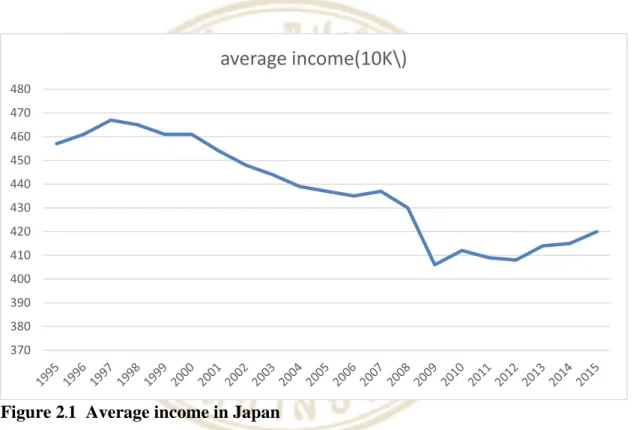
METHODOLOGY
- Research Design
- Sample Size
- Questionnaire Design
- Personal demographic information for first 6 questions
- 11 Questsionns to clarify Maslow’s hierarchy needs
- 10 Questions to clarify Job characteristic situation
- 8 Questions to clarify employees’ motivation
- Data Analysis
The sample for this study was collected from Japanese employees living in Bangkok and Japan. The researcher will use Yamane's published tables showing sample sizes for a given set of criteria to determine the sample (Yamane, 1967). According to the sample size table above, the researcher will administer 100 sets of questionnaires on July 18 to determine the sample size. 26th, in 2017 via Google Form.
The research questions in this study were developed based on the literature review related to hMaslow's hierarchy of needs and the characteristic work model. 3 Challenging work is difficult for you 4 You feel that you belong to your company 5 You have been promoted well so far. 8 Your company offers good remuneration/bonus for your work 9 Your company gives a chance to improve your skills 10 You can control your own career in your company 11 You have ownership of your work.
1 The job requires you to do many different things at work 2 Your job is significant or important. 4 Managers or colleagues tell you how well you do your job. Section 3: 10 Questions for clarification of job characteristic situation (continued). 5 The job itself gives you information about your work effort 6 You are satisfied with the job.
7 You feel responsible for the work you are doing 8 You think you want to quit your job. 2 Better benefit is the important factor for your work motivation 3 Good relationship with your colleagues is the important factor for you. 4 Learning new skills is the important factor for your work motivation 5 The possibility of promotion is the important factor for your work motivation 6 Challenges for your important project is the important factor for you.
7 Good feedback or recognition for your work is the important factor for your work motivation. Various statistical methods will be used to test the hypotheses related to the topic of the factor affecting the motivation of Japanese employees.
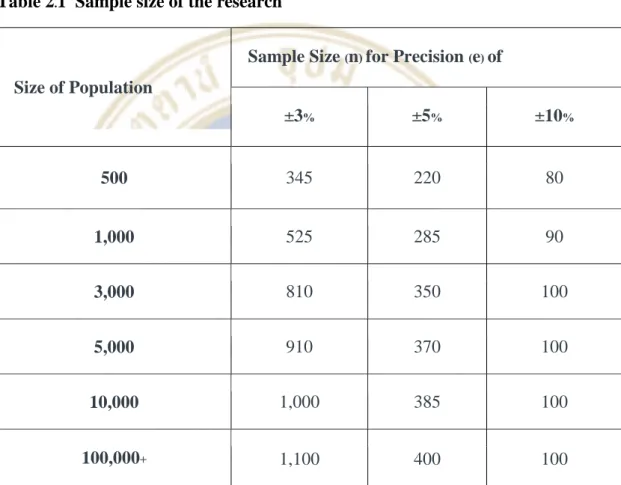
FINDINGS
Result and Analysis
Analysis of Motivation for Promotion
- Mean value of Japanese employees’ motivation
- Regression analysis for each motivation and demographic factors Regression analysis of wage and demographic analysis tells that Job title is
- Promotion Vs Job satisfaction
- Cross Tab Promotion Vs Quit job
3 Good feedback or recognition for your work is the important factor for your work motivation. The regression analysis of good relations and demographic factors shows that age is the most significant factor for the motivation of good relations with the colleague. Regression analysis of good feedback or job recognition and demographic factors says that age is the most important factor for this motivation.
Regression analysis of learning new skill and demographic factor indicates that men are more motivated than women to learn new skill. Regression analysis of the best benefit and demographic factor shows that Job Title and Earnings have a significant relationship between the motivation. Both factors work negatively on this motivation, which means higher job title and earnings employees have less motivation for good benefit from a company.
With regression analysis of other motivations and demographic factors, re is not a significant factor. By cross-analyzing progress to date and job satisfaction, it is likely that employees who have not progressed well so far are dissatisfied with their work. If employees rate their career as progressing well, their satisfaction will be higher.
Cross-Tab Analysis of Promotion So Far vs Quit Job analyze the relationship between the factor of an employee who rates himself as being promoted well or not so far and an employee who wants to quit his job. The result shows the tendency that employees who could not be promoted well so far tend to think that they want to quit the job, while a well-promoted employee does not think that they want to quit. One way ANOAVA analysis clearly shows the correlation between promotion and how much employees want to quit a job.
If employees could not have promoted well so far, they tend to want to quit a job.
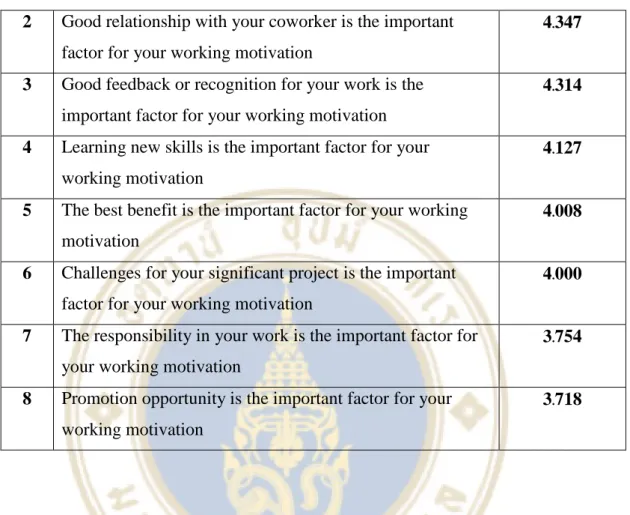
Regression Analysis of Motivation Vs Frameworks
- Wage
- The best benefit
- Good relation with coworker
- Learning new skills
- Promotion opportunity
- Chellenges for significant project
- Good feedback or recognition for work
- Responsibility in work
Regression analysis of the motivation for wade and Job characteristic factors shows Job identity has a significant relationship with the motivation for pay. Regression analysis of the motivation for benefit and Maslow's needs shows that salary satisfaction, belonging to the company, managerial career and job ownership have significant relationship with the motivation. Regression analysis of the motivation for benefit and job characteristic facts shows that Job Meaning and Job Satisfaction have significant relationship with the motivation.
Regression analysis of the motivation for good relationship and Maslow's needs indicates that job ownership has significant relationship between the motivation. Regression analysis of the motivation for good relationship and work characteristics model shows that there is no significant factor for the motivation. Regression analysis of the motivation for learning a new skill and Maslow's needs does not show a significant relationship.
Regression analysis of motivation for promotion opportunities and maslo w needs shows that good rewards reduce motivation for promotion. Regression analysis of the motivation for promotion opportunities and the job characteristic model shows that employees with high job responsibility have a higher motivation for promotion. Regression analysis of the motivation to challenge an important project and Maslow's needs shows that employees who rate themselves as valuable in the labor market tend to have high motivation.
Regression analysis of the motivation to challenge a significant project and job characteristic model shows that good feedback from colleagues reduces motivation. Regression analysis of the motivation for good feedback or recognition and Maslow's needs shows that there is no significant factor. Regression analysis of the motivation for good feedback or recognition and job characteristic model shows that there is no significant correlation.
In this analysis, there is no significant relationship between the motivation for good feedback or recognition for work and Maslow's needs or work characteristic mode l factors. Regression analysis of the motivation for good feedback or recognition and job characteristics model shows that there is no significant relationship. Regression analysis of the motivation for job responsibility and job characteristic factors shows that there is no significant relationship.
In this analysis, there is no significant correlation between the motivation and the framework for Maslow's needs and job characteristics model.
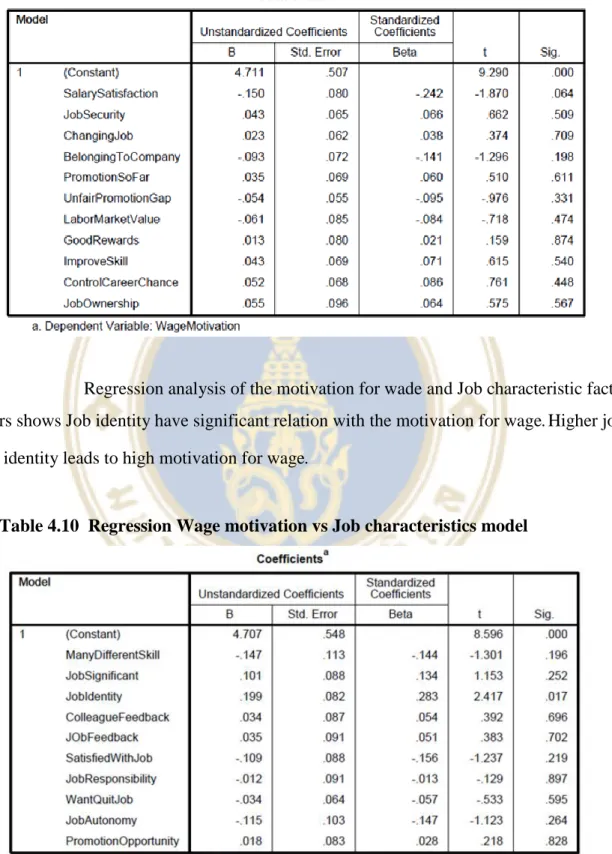
Summary of analysis
But fair promotion opportunity, unity between different generations and feedback from the work increases the motivation a bit. Next chapter talks about the proposal for Japanese companies based on what was found at the study in this chapter.
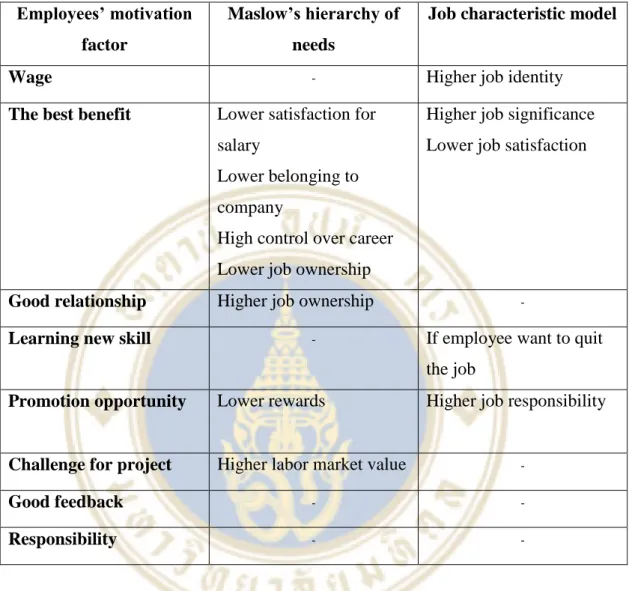
RECOMMENDATION AND CONCLUSION
Recommendation for Japanese company
- Develop higher Job ownership
- Provide Good Rewards
- Provide Good Feedback or Recognition
According to the analysis, researcher develops 3 practical recommendations for Japanese companies to improve employee motivation. From the analysis, if job ownership becomes higher, employee evaluates Good relationship as more important for their work motivation. In this process, Japanese company must involve older age or higher job title employee.
Because they are motivated by the good relationship with colleagues, which is influenced by high job ownership. The analysis shows that employees who receive lower compensation from company compensation. Promotional opportunities are more important for their motivation. In other respects, good company compensation can reduce the significance of promotion opportunities for employees.
And there can be various rewards, not only bonuses, but also temporary rewards such as special prize money for the best sales performance. Giving good feedback or recognition is the third important motivation factor, after a good relationship with a colleague. But as shown by demographic factors, older workers or workers in higher positions rate this motivation factor as important to their motivation.
Conclusion
Limitation and Future research
- Conduct interview
- Set more specific factors for survey
APPENDICES
6 There is an unfair gap for promotion opportunities between generation 7. Your market value is high in the labor market. 4 Managers or colleagues tell you how well you do your job 5 The job itself gives you information about your work effort 6 You are satisfied with the job.
